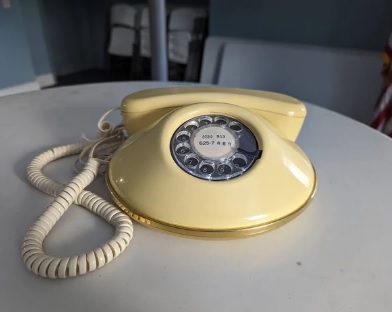(I’ve wanted to do a story about Dunbarton Telephone Co. for a long time. This gave me an excuse!)
When the AT&T mobile network went down nationally last month, taking some other networks down with it, folks in Dunbarton were able to shrug things off.
“Oftentimes folks say, ‘I haven’t had a landline in years. I always rely on my cell phone.’ … We tell them: you have a line, might as well plug a phone in. It’s a good reliable connection,” said David Montgomery, general manager of Dunbarton Telephone Co., one of the few independent phone companies left in the state.
Dunbarton Telephone has survived despite not being part of the cell-phone revolution. Every one of its customers has a line running to their home or business. And while many of them buy the connection strictly to go online, since Dunbarton has no cable TV franchise to offer Internet service, they also have access to what the industry calls POTS, or plain old telephone service, through a landline phone.
Ah, landline phones. Once the monopolistic system for all communication, they have become the telecom equivalent of rented movies on a DVD, used by an ever-smaller segment of the population.
“Since 2004, landline usage is down 90%. We see trends of (declines) around 10% a year, the last several years,” said Rob Koester, vice president of consumer product management for Consolidated Communication, which has the phone franchise for most of the state.
And while landlines are a little more common in rural areas, where cellphone coverage can be spottier, “I don’t think anything you would see in New Hampshire is different,” he said.
Landlines have two big advantages over cell phones. They automatically give your address when connected to 911 and they are incredibly robust. A landline works even when power is out because of the way the system was built, including small batteries installed throughout the network, so there are no worries about your phone battery dying.
“A small voltage is always present, just enough to ring the phone,” said Koester.
That is true even if your landline goes over fiber, which is more robust than old copper lines. ” I’ve seen fiber cables taken down by trees, lying flat on the ground, still functioning properly,” said Koester.
And I was surprised to learn the robustness stays even if you have voice over Internet protocol (VOIP). Apparently I’m not the only one surprised. “Every single meeting we go to the power for VOIP comes up,” said Koester.
One caveat: A cordless landline phone won’t work without electricity because it requires power to the base station in your house. The phone line works but you can’t access it.
People were talking about landlines on Feb. 22 when hundreds of thousands of AT&T customers lost service for many hours in a network outage. Folks whose entire world exists in that amazing glass-fronted rectangle were suddenly wistful that their friends could still reach out and touch someone, as Ma Bell put it in the old commercials touting long-distance calls.
That doesn’t mean, however, that Consolidated should expect a surge of new landline orders. “I don’t believe that we saw a significant increase in the number,” Koester said. The advantages of portability still hold sway.
But for Dunbarton Telephone, landlines are its present and future.
Dunbarton Telephone is very small, serving about 1,360 lines with six full-time and one part-time employee, and is still family-owned. Montgomery’s grandfather bought it in 1952. New Hampshire once had a score of small phone companies – if you go back a century we had 100 or more, many connecting just a few buildings in a single village – but virtually all became part of Bell Telephone in the old days or more recently TDS Telecom, which has made a good business out of combining scattered phone companies.
Dunbarton Telephone has survived partly from the lack of Internet competition from a cable company, which has made it easier to grow the online business in partnership with Granite State Telephone. And it has future-proofed itself with help from Granite State Telephone in Weare by changing out all its copper lines, an accomplishment that Consolidated Communications is still working on.
“We are 100% fiber optic lines. It was completed just before the pandemic,” said Montgomery. “That has helped to get the (subscriber) numbers up.”


 Return to the Concord Monitor
Return to the Concord Monitor
We have always had a landline phone here in Milford. A couple of years ago when we switched to Consolidated fiber we kept our landline. With Consolidated/Fidium fiber the emulation of old school analog telephone occurs at the customer’s ONT (optical network terminal). It is true a downside of fiber is phone service requires local power but knock on wood since the state “encouraged” utilities to be more aggressive with tree trimming lengthy outages have not occurred.
The article mentioned fiber being pretty tough. A year ago January we had several trees come down along our driveway that broke the top off our utility pole closest to the street, taking out power but even though the fiber was laying on the ground it still worked. We have a UPS to keep our LAN alive so internet and telephone were not effected. For longer outages we can always fire up our generator.
I want to put in a plug for fully fiber networks in terms of emergency robustness. Fiber PON (passive optical network) does not require power in the outside plant network so as long as the ISP and customer are able to provide power and the fiber itself is not damaged it will work. If phone service is important to you it is always a good idea to have multiple methods of communication. In our case VoIP landline and cell phones.